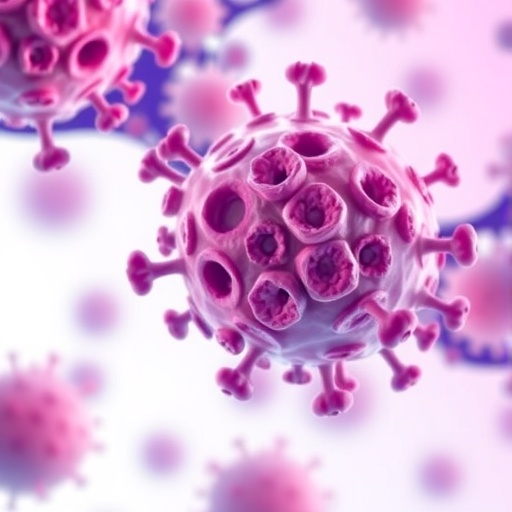A team of researchers at the Center for Cell-Based Therapy (CTC), an innovative hub within the Ribeirão Preto Medical School at the University of São Paulo, has unveiled critical insights into the molecular underpinnings of CAR-T cell therapy. Published in the renowned Journal of Proteome Research, the study sheds light on key proteins and signaling pathways that define the efficacy of this groundbreaking form of immunotherapy used against various forms of cancer. CAR-T cells, lymphocytes engineered in the laboratory, are designed to target and eliminate cancer cells, yet their precise molecular mechanisms have remained enigmatic until now.
This research represents a significant leap forward in understanding how CAR-T therapies function at the cellular and molecular levels. Although CAR-T cell therapy has revolutionized treatment for certain hematological cancers, the detailed molecular pathways it exploits to exert therapeutic effects are not fully understood. The study’s lead author, John Oluwafemi Teibo, a doctoral candidate funded by FAPESP, in collaboration with Professor Vitor Faça, used comprehensive proteomics approaches to dissect these unidentified mechanisms and reveal potential targets to enhance therapy efficacy.
Proteomics, the large-scale study of proteins and their functions, plays a pivotal role in decoding the complex landscape of cellular communication and response. Utilizing advanced mass spectrometry techniques, the research analyzed thousands of proteins involved in CAR-T cell activity, focusing on identifying molecular effectors—key molecules that respond to biological stimuli to facilitate immune modulation and cancer cell eradication. This approach allowed them to map signaling cascades and molecular agents that could hold the keys to improving the therapeutic potential of CAR-T cells.
The study identified fourteen pivotal proteins falling into four primary functional categories: cytokines, kinases, receptors, and proteases/chemical messengers. Cytokines such as interferon gamma and CCL3 act as signaling proteins that modulate immune responses, while kinases including LCK, ITK, and JAK2 serve as critical regulators of signal transduction pathways that activate CAR-T cells. Receptors like CD80 and CD20 facilitate the recognition and binding to target cancer cells, enabling the CAR-T cells’ cytotoxic action. Proteases such as Granzyme B and inflammatory mediators like TNF-α execute direct cancer cell lysis and modulate surrounding immune activity.
Such detailed protein characterization expands the fundamental knowledge base for CAR-T cell immunotherapy. By understanding these proteins’ roles and regulation, scientists are better equipped to design improved CAR-T constructs with heightened effectiveness and fewer side effects. For example, the identification of surrogate biomarkers like interferon gamma and interleukin-2 (IL-2) offers promising tools for clinical monitoring, which could help in predicting patient responses and managing adverse effects during therapy.
Central to the study’s success is the employment of cutting-edge mass spectrometry techniques, which allow for the sensitive detection and quantification of proteins, including their cellular localization, dynamic synthesis and degradation rates, and post-translational modifications. These molecular insights are essential for capturing the full complexity of CAR-T cell behavior and for creating more precise therapeutic strategies that optimize patient outcomes.
CAR-T cell therapy’s innovation lies in its ability to reprogram patients’ own immune cells to combat cancer more effectively, but challenges such as therapy resistance, off-target effects, and the tumor microenvironment’s complexity remain. The molecular effectors elucidated by this study could inspire novel therapeutic targets that mitigate these issues, opening avenues for personalized medicine and combinatorial approaches that integrate proteomic data with clinical parameters.
The researchers’ interdisciplinary work, backed by the São Paulo Research Foundation (FAPESP), exemplifies the power of collaborative science and technology innovation. FAPESP not only supports fundamental research but also fosters international collaborations, thus contributing to global efforts against cancer and advancing immunotherapy modalities by supporting projects such as this one.
Moreover, this study exemplifies how emerging technologies in proteomics can revolutionize biomedical research. The integration of protein profiling with functional assays allows for a more comprehensive and dynamic picture of immune cell function. Such approaches will be indispensable in addressing unanswered questions about CAR-T cell persistence, exhaustion, and tumor evasion mechanisms, ultimately guiding future clinical trial designs.
As CAR-T therapies continue to evolve, studies like this lay the groundwork for the next generation of cancer treatments—tailored, targeted, and based on a deep molecular understanding of immune mechanisms. The identification of novel protein targets and signaling pathways enriches the scientific landscape and promises to catalyze innovations that could translate into more effective therapies against not only hematological malignancies but potentially solid tumors as well.
This research not only expands the horizons of immunotherapy science but also heralds the critical role of proteomics in translational medicine. By bridging molecular biology and clinical application, proteomic strategies empower researchers to dissect immune responses with unprecedented precision, offering hope for improved therapeutic outcomes for cancer patients worldwide.
In summary, the unveiling of these molecular effectors and the advanced proteomic methodologies employed form a compelling narrative of scientific discovery with tangible clinical implications. The study stands as a beacon for ongoing efforts to decipher cancer immunotherapy’s complex biology and optimize therapeutic efficacy, embodying the fusion of innovative research, technology, and clinical ambition.
Subject of Research: Molecular effectors and signaling pathways involved in the efficacy of CAR-T cell immunotherapy in cancer management.
Article Title: A Proteomics Outlook on the Molecular Effectors of CAR-T Cell Therapy in Cancer Management
News Publication Date: 6-Mar-2025
Web References:
- Center for Cell-Based Therapy (CTC): https://ctcusp.org/
- FAPESP: https://cepid.fapesp.br/en
- Journal of Proteome Research article: https://pubs.acs.org/doi/full/10.1021/acs.jproteome.4c00930
- DOI link: http://dx.doi.org/10.1021/acs.jproteome.4c00930
References:
Teibo, J.O., Faça, V.M., et al. (2025). A Proteomics Outlook on the Molecular Effectors of CAR-T Cell Therapy in Cancer Management. Journal of Proteome Research. DOI: 10.1021/acs.jproteome.4c00930.
Keywords: Immunotherapy, CAR-T cell therapy, Proteomic analysis, Signaling pathways, Cytokines, Kinases, Protein biomarkers, Cancer immunology, Cellular physiology, Hematological malignancies.




